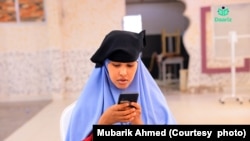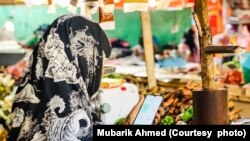Sahamiye Foundation is a charity founded by Ismail Ahmed, a Somaliland-born business mogul, which according to its website is "dedicated to transforming lives through the promotion of literacy and education."
At the height of the pandemic, it launched "Daariz," meaning study in Arabic, a free language app to further its mission. In a statement to VOA, the foundation said since 2021, the app has helped 350,000 people develop Somali language literacy skills.
On the Google App store, the Daariz app has been downloaded by more than 100,000 people with a 4.9 star review by users.
"This literacy app, we think, would really make a difference in terms of learning the mother tongue, because currently it takes up to 450 to 500 hours for someone to become functionally literate in their own mother tongue, but based on the hard data we have been able to collect, the app has...(reduced that to)... just 50 hours," Ahmed told VOA. "
The challenges bedeviling the region - which encompasses Somaliland, Somalia, Ethiopia, Djibouti and Kenya - has led to "low school enrollment and limited access to quality education," the charity said, noting that "as a result, over 70% of late primary school students in the region cannot read and understand a simple story in Somali."
Ahmed said the app specifically designed to offer offline accessibility to users has empowered particularly women and girls to overcome "significant educational barriers."
According to Ahmed — who is also the founder of the digital remittances company WorldRemit — people who reside in the Horn of Africa, along with the rest of the world, have embraced mobile money and are becoming cashless economies. As a result, it has become increasingly difficult for those who can't read or write to use such online money transaction platforms.
"Women who are (petty) traders in major markets rely on other people to assist them make payments and receive money because the economy has become cashless," he said adding that "so literacy has become essential."
"We've also purchased cheap smartphones, giving these to some of the schools who can't afford it, particularly in rural areas where people don't have smartphones and then try and make a scheme where instead of students borrowing books, they can borrow a smartphone preloaded with all these programs."
The Sahamiye Foundation has a vision to add other subjects like mathematics and science for those who could not get the chance at an education early in life.
"We are partnering with local education authorities, schools, Koranic schools and adding other subjects like Arabic, because we want children who go to Koranic schools to learn Somali," Ahmed said.
"We're adding math and science as well so those who have missed schools can at least get basic education."








Forum